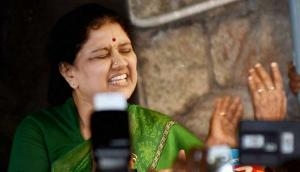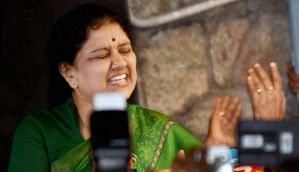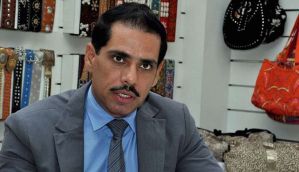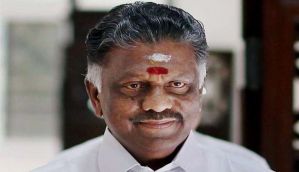J'khand varsity revokes suspension of teacher who invited 'anti-national' prof
Associate professor Shreya Bhattacharji of the Central University of Jharkhand is back at work after the university administration withdrew its notice of suspension against her for inviting a retired JNU professor to an event on campus.
The suspension order referred to the professor as 'anti-national' and said he was the mentor of the six JNU students charged with sedition.
The suspension was revoked after an inquiry panel concluded that while Bhattacharji had committed a "genuine lapse" by not seeking written permission from the vice chancellor to invite Panini, her mistake was not deliberate, says The Telegraph.
BJP worries Haryana's new Jat quota bill has alienated its core base
The decision of the Haryana government to provide reservations for Jats has angered the BJP's core supporters.
Kurukshetra MP Raj Kumar Saini has threatened to go to court over the matter, while senior party leaders worry that the new bill that gives Jats reservations will raise the level of agitations for the same privilege by other communities in other states, including the Patels in Gujarat.
Jats are the dominant caste in Haryana, says The Economic Times. However, the BJP's core base in the state is composed of non-Jats.
BJP's Sambit Patra under medical council scanner for negligence
The Delhi Medical Council is investigating a complaint made against BJP spokesperson Sambit Patra and another doctor in a case of post-operative negligence.
The complaint dates to 1 August, 2014, and was filed by a general physician who said that her 81-year-old mother after being operated upon for piles by surgeons Alok Aggarwal and Patra at NKS Hospital in 2013, received no post-operative care or supervision, which led to heavy bleeding and her death within a week of the surgery.
DMC president Arun Gupta said a date for hearing the complaint will soon be fixed, according to The Economic Times.
Despite HC order, women stopped from entering core area of Shani Temple
Women activists at Shani Shingnapur Temple were stopped by the police from entering the core area to offer prayers on Thursday, despite the Bombay High Court's order of 30 March that "women cannot be prevented from entering a place of worship".
More than 100 policemen blocked the entrance to the temple's core area and asked the 40 women activists who had arrived there to show copies of the high court's observations, or else move away from the area, according to The Indian Express.
Mehbooba likely to take oath on 4 April
People's Democratic Party president Mehbooba Mufti will take her oath as the chief minister of Jammu and Kashmir on 4 April, finally ending governor's rule in the state.
"Mehbooba Mufti will take oath of office as the chief minister on 4 April," Peoples Democratic Party sources said in Jammu.
The decision to take oath on 4 April has been conveyed to Governor NN Vohra, says NDTV.
PDP sources said the quick decision to form the government was to end speculation that the BJP and PDP are arguing over portfolio distribution.
Firm behind Kol flyover had been on Railways' watchlist
Infrastructure firm IVRCL which held the contract to construct the flyover that collapsed in Kolkata on 31 March had been banned by the Railways for "non-performance".
According to SC Agnihotri, chief managing director, Rail Vikas Nigam Limited (RVNL), "Because of non-performance, we had terminated a few of their contracts."
IVRCL also had a tunnelling contract with railway construction giant, IRCON, terminated. A senior IRCON official said: "We were very disappointed with the work."
China does it again, blocks India's UN bid to ban JeM chief Masood Azhar
China has, for the second time, blocked India's bid requesting the United Nations to ban Masood Azhar, chief of the Pakistan-based terror outfit, Jaish-e-Mohammed (JeM). In 2001, the UN had banned JeM but India's efforts to ban Masood Azhar after the 26/11 Mumbai terror attack did not fructify as China - one of the five permanent members of the UN group with veto powers - did not allow the ban apparently, at the behest of Pakistan.
According to media reports, India is unhappy at the developments which are being seen as a failure of diplomacy. Reports suggest that India will soon respond to China's stand. According to highly-placed sources, China requested the UN committee - which is considering the ban on Masood, who is alleged to be the mastermind of the 2 January Pathankot terror attack - to hold on to the decision, just hours before the deadline earlier today.
Death toll rises to 23 in Kolkata flyover collapse tragedy
The collapse of an under-construction flyover that took place in North Kolkata's Girish Park brought the city to a standstill on 31 March. Rescue operations are in their final stage, as debris is still being cleared. The death toll has reportedly risen to 23.
Last evening, West Bengal Chief Minister Mamata Banerjee confirmed that 21 had died and 85 others injured in the mishap.
The bridge collapsed in the afternoon and by the evening, army teams took over the charge of the rescue work - a collaborative effort by teams from the NDRF, the police, the fire brigade and others. Top officials of the state and city police administration and Kolkata Mayor coordinated the rescue at the spot. The rescue work has been going on war footing.
Do you know how much Google's Sundar Pichai was paid in 2015? Hint: It's way too much!
Indian-origin Google CEO Sundar Pichai made a whopping $100.5 million in the year 2015. That's right. The figure was disclosed via a regulatory filing on 29 March.
The filing revealed that Pichai was paid a salary of $6,52,500, received restricted stock worth $99.8 million (to vest fully in 2017) and awarded other compensation for $22,935.
Last February, Google awarded Pichai $199 million in restricted stock, which was the biggest grant reported by a Google CEO, according to Bloomberg.
Sun's superflares can destroy the earth
The Sun is capable of producing monstrous eruptions or 'superflares' that can not only break down radio communication and power supplies, but also affect Earth's ability to support life, scientists say.
Evidence from geological archives has shown that the Sun might have produced a small superflare in 775 AD.
"The magnetic fields on the surface of stars with superflares are generally stronger than the magnetic fields on the surface of the Sun," said Christoffer Karoff, from Aarhus University. However, of all the stars with superflares that researchers analysed, about 10 per cent had a magnetic field with a strength similar to or weaker than that of the Sun's.
If an eruption of this size was to strike Earth today, it would have devastating consequences. Not just for all electronic equipment on Earth, but also for our atmosphere and thus our planet's ability to support life.







![BJP's Kapil Mishra recreates Shankar Mahadevan’s ‘Breathless’ song to highlight Delhi pollution [WATCH] BJP's Kapil Mishra recreates Shankar Mahadevan’s ‘Breathless’ song to highlight Delhi pollution [WATCH]](https://images.catchnews.com/upload/2022/11/03/kapil-mishra_240884_300x172.png)

![Anupam Kher shares pictures of his toned body on 67th birthday [MUST SEE] Anupam Kher shares pictures of his toned body on 67th birthday [MUST SEE]](https://images.catchnews.com/upload/2022/03/07/Anupam_kher_231145_300x172.jpg)






